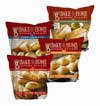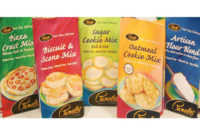La Brea Bakery Positive About Economy
Katie Despard Kelsey, director of marketing at La Brea Bakery, discusses the economy and how it’s impacting bread sales.

In an exclusive interview with Snack Food & Wholesale Bakery magazine, Katie Despard Kelsey outlines the opportunities and challenges that the baking industry faces in 2009.
Snack Food & Wholesale Bakery: Conventional wisdom says the baking industry is recession-proof. Do you agree or disagree with this statement and why?
Katie Despard Kelsey: Yes, I do agree with the idea that the baking industry is essentially “recession-proof” for two reasons.
First of all, people have been eating bread for centuries. Ninety-nine percent of households today purchase some form of bread on a regular basis. Despite current inflation rates, it is still seen as a relatively inexpensive, filling and wholesome food for both smaller households and families alike. Bread also is incredibly versatile, which enhances consumer perception of value in today’s challenging economic climate. It is applicable any time of day for any meal or snacking occasion.
Secondly, when it comes to historic consumer purchasing patterns, sales of more indulgent bakery items such as cakes, cupcakes, cookies, pies, donuts, etc., have actually increased during periods of economic recession. In a recession, consumers typically eat out less, and eat at home more. In addition, baked goods are universally seen as “comfort food” by consumers across all demographics. They also are an accessible indulgence [and] an affordable way for consumers to “treat” themselves and their families when money is tight.
SF&WB: What is the economic outlook for the baking industry and the economy in general?
Despard Kelsey: As for the economy in general? I wish we knew! The current economic conditions were created over time, and it will take time for our economy to rebound. My research indicates that although current economic conditions are a very real challenge -- and constant threat -- to many households, there also is a large segment of the population that has modified their spending and investing habits on a purely reactionary, emotional basis.
There are millions of consumers that are, in fact, secure in their jobs, with the same amount of disposable income they had over the last few years. However, the bad news is seemingly now delivered on a daily basis about layoffs and the erratic performance of Wall Street has a very powerful emotional affect.
Optimistically, I believe that our economic recovery will begin in the second quarter when the job and income-stable consumers let down their guard and begin to make more and larger purchases. The rest of the country will be slower to follow suit, however, being as though several industries and companies have been hit very hard in the past few months. This type of recovery is less about rebounding and more about rebuilding, which could take quite some time.
When it comes to the baking industry, I believe the long-term economic outlook is positive, overall. Fluctuating commodity prices will remain the biggest challenge for manufacturers through 2009. And consumer confidence will remain the biggest issue for retailers through 2009 and by virtue, a challenge for manufacturers as well.
Although the baking industry is considered to be “recession-proof” on many levels, it will be key for both manufacturers and retailers to stay focused on providing consumers with innovative, high-quality, tangible value [and] to make every dollar count toward guaranteed satisfaction.
SF&WB: Would you rather have the commodity crisis of last year or the recession that we are in now? Why?
Despard Kelsey: If I had to pick, I suppose I would choose the recession simply because of the historic resiliency of our industry during tough economic times. Ultimately, commodity prices are not in our control, but reinforcing consumer confidence with consistent innovation and high quality is. There is a big difference between having to pass on price increases to consumers and dealing with consumers that are managing their money more vigilantly. When it comes to being forced to price yourself out of the realm of perceived value or being tasked with consistently reinforcing the perceived value for your price point, I would definitely choose the latter.
SF&WB: How are you tailoring your product portfolio to meet changing consumer and customer trends?
Despard Kelsey: Both our customers and consumers are increasingly looking for premium products that fit into an everyday value equation. This can be as simple as using the highest quality all-natural ingredients, which La Brea Bakery has always done, or developing new flavor profiles and formats that will continue to create new artisan bread consumers.
SF&WB: What is the next big trend after whole grains?
Despard Kelsey: More flavor. With consumers’ increased exposure to trans continental ingredients, recipes and culinary traditions, they are becoming more and more accustomed to stronger, more sophisticated flavors and textures. In line with the ever-growing wellness trend, spices, herbs, fruits, vegetables, nuts, salts, vinegars, olive oils -- and unique ingredient combinations thereof -- will be used to create more intense flavors, as opposed to relying on various dairy and animal fats.
SF&WB: How are you communicating with consumers through merchandising or packaging?
Despard Kelsey: We communicate with our consumers on a variety of levels. At the store level, we rely on our packaging, our point-of-sale location and our in-store bakery partners to communicate key ingredients, health benefits, recipe suggestions, etc. We also have a robust consumer-friendly Web site that provides a host of information regarding our history, our company including news and events, our breads including nutritional and ingredient information and dozens and dozens of recipe suggestions. We also publish four consumer newsletters each year that we distribute both in print and electronically to our subscribers.
Editor’s Note: Check out our upcoming March issue of Snack Food & Wholesale Bakery magazine for more consumer trend and new product information on variety breads and the bread aisle.
Looking for a reprint of this article?
From high-res PDFs to custom plaques, order your copy today!




